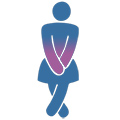
What Is Pelvic Floor Physiotherapy?
Pelvic floor physiotherapy is a branch of physiotherapy which includes assessment & treatment of various conditions affecting the muscles, ligaments, fascia and nerves of the pelvis.
Pelvic floor related problems can be caused by the following:
- Hypertonic Pelvic Floor Muscles (Tight pelvic floor muscles) – Tightness in pelvic floor muscles can result in incontinence, urinary & fecal urgency, constipation, pelvic pain, dyspareunia, vaginismus, vulvodynia, Interstitial cystitis, chronic prostatitis and pudendal neuralgia
- Hypotonic Pelvic Floor Muscles (Weak pelvic floor muscles) – Weakness in pelvic floor muscles can result in incontinence and pelvic organ prolapse.
According to a Cochrane review in 2010 physiotherapist with specialized training in pelvic floor should be considered as first line of treatment before considering surgery for incontinence.
What Does A Pelvic Floor Assessment & Treatment Entails?
The therapist would take a detailed subjective history and would use both external & internal techniques to thoroughly assess and treat pelvic floor dysfunctions.
Pelvic floor physiotherapy treatment would be a combination of the following:
- Manual therapy (Hands on techniques)
- Modalities including electric stimulation, biofeedback
- Stretching & strengthening exercises
- Education on pelvic floor muscles & their function
- Mindfulness healing
Treatment would be customized based on the individual’s needs.
Why Internal Exam Is Necessary To Assess And Treat Pelvic Floor?
For a thorough assessment of pelvic floor, penetration beyond vagina and/or rectum us necessary. Pelvic floor muscles play an important role in conditions like incontinence, prolapse & pelvic pain. Tightness and/or weakness in pelvic floor muscles cannot be properly assessed or treated just via external examination.
Who Can Benefit For Pelvic Floor Physiotherapy?
You can benefit from pelvic health physiotherapy if you are suffering from one of the following conditions:
- Incontinence – Uncontrolled leakage of urine or feces.
- Urgency – A strong uncontrollable urge to urinate or defecate.
- Frequency – Urinating or defecating frequently affecting the normal routine
- Pelvic pain – Pain within pelvic region
- Nocturia – Waking up at night to urinate



